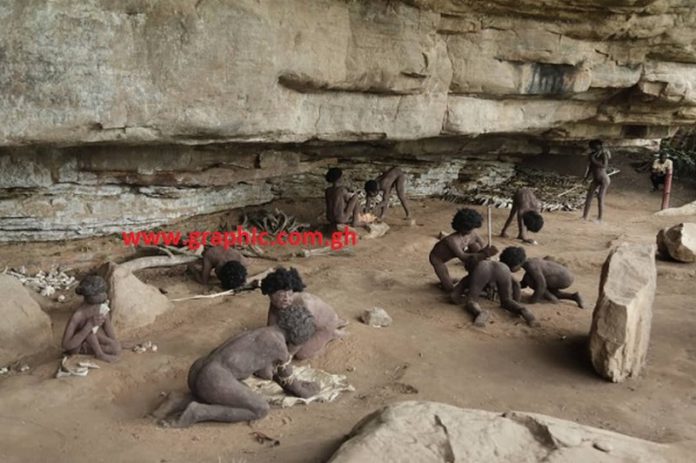An ancestral home of the Kwahu people at Abetifi in the Eastern Region dating over 12,500 years old has been converted into an eco-tourism Park.
The site, known as the “Abetifi Stone Age Park”, sits on a 52-acre land.
Prior to the development of the Park, part of the land used to be a refuse dump.
The founder of the Park, Ben Addo, who is an indigene of Abetifi, said he was pushed to establish the Park after the Archaeology Department of the University of Ghana (UG) confirmed the results an excavation at the site through carbon dating.
Explaining how he got to know about the site and the rationale for establishing the Park, Mr Addo said having lived in Germany for about 25 years, he decided to come home for some holidays together with his family.
It was during the holiday visit that he met the Head of the Archaeology Department of UG, one Dr Wattson, who at the time had come to the Bosompra caves at Abetifi to conduct some archaeological excavations.
He added that in 2013, Dr Wattson wrote to him, telling him that the carbon dating they conducted on the artifacts they found at the Bosompra Caves indicated that people lived at the site about 12,500 years ago, more than 10,500 years before Jesus Christ was born.
That, Mr Addo said, when he read the letter from Dr Wattson, he was shocked about the findings and therefore decided to work to convert the place into a Park that will tell the story of the Kwahu people and Ghana as a whole.
“This was very intriguing to me. And I found myself asking rhetorical questions; does this mean these people preceded the birth of Christ looking at that date now. That was about 10,500 years before Jesus Christ was born. How tall were these people? What were they eating? Where did they bury their dead people?” he asked.
He said even though he had not achieved how he intends to develop the Park, he feels fulfilled that at least, the vision to recreate the Park has been done.
Appreciation
Mr Addo also commended the chiefs of Kwahu, particularly Kwahu Adontenhene and Chief of Abetifi for their instrumental role in donating on gratis, the 52-acre land which the Park occupies.
For him, the chiefs did not take money from him and instead, contributed their financial resources to the project.
He said even though he (Addo) had initiated the Park, the project belongs to the whole people of Kwahu, saying that the Park will help to preserve the rich culture and history of the people of Kwahu.
He disclosed that his greatest mission was to build a museum that will serve as a curator of Ghanaian history, particularly that of the Kwahu people.
Mr Addo also commended the Archeological Department of the University of Ghana for their key role in the establishment of the Park, calling on all relevant stakeholders to support the development of the Park.
Tourist sites in Kwahu
The Kwahu area can boast of many tourist sites, including Oworobong Waterfalls, Bruku Rock, Afram River, Airjays, Mystical Cave, Abetifi Stone Age, Echo Ravine/Padlock Rock, and Kwahu Aduamaoh Fort.
Appeal
President Nana Addo Dankwa Akufo-Addo who launched the Park appealed to Ghanaians to stop dumping of refuse into tourist attraction centres in the country.
He said stopping the practice of dumping refuse at tourist sites will help protect the country’s environment as well as promote the tourist sites.
He commended the Founder of the Abetifi Stone Age Park for converting the refuse dump site into a Park that will help to tell the history of the people of Kwahu.
“I congratulate Mr Ben Addo for this brilliant solution,” he commended the Founder of the Park, saying his action has helped to protect the environment and also preserve the history of his people and that of Ghana.
President Akufo-Addo also appealed to Chiefs to help protect environment, explaining eco-tourism was contributing significant revenues to many economies in Africa.
The President also encouraged the people of Kwahu to own the Park and protect it, saying that government will also make the necessary contributions to the development of the Park.
Who are the Kwahus?
Kwahu features the highest inhabited spot in Ghana – it is where the Christian Missionaries from Basel found their own “new Switzerland” – and the rocky green plateau breathes fresh air.
The name Kwahu applies both to the people and the area, and has several dramatic explanations of its origin.
One such explanation is that it was given to a tribe which decided to resist the expanding domination of the Ashanti Empire and barricaded itself on a high ridge overlooking the Afram River (now part of the Volta Lake).
These peaceful people were nevertheless stout enough to guard their land by threatening to roll rocks down on anyone who came after them, and so outsiders called the area ‘’Kwahu’’- Go and die! We are happy to say that today’s welcome is warmer.

